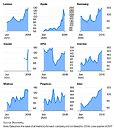Tuesday, September 4th 2018
Surging Tech Companies' Inventories Could Spell Trouble for the Industry
Even as we achieve consumerism in scales hitherto unseen, tech companies always want to sell more - there's "always" increased production, there must always be increased, projected demand from customers. However, when demand isn't there, and growth slows down or even stagnates, production takes its time to adjust - and already manufactured products have few opportunities other than going on towards a swelling inventory.
This is what is happening with a myriad of tech companies, such as Apple, Samsung, Xiaomi, Intel, Hon Hai (Foxconn), among others. We could even take a page from our own PC industry and look at NVIDIA's Pascal inventory that is in need of clearing up - and which has resulted in bottoming prices of previous-gen cards as we look towards the new RTX 20-series. Which, coincidentally, have been launched with increased pricing over the previous generation. Perhaps another way of moving old inventory?All of these companies are achieving inventory levels that are 20 to 30 percent increased YoY (year over year), with the exception of Apple, which doubled its inventory. At the same time, that the turnover period for stocks (that is, the time it takes for old stock to be sold and rotated for new inventory) is slowing is an interesting pointer for not only decreased demand, but also overproduction. And as we've seen with some companies which have had to write-downs millions of dollars in unsold hardware, though, these downturns have very real implications for companies' bottom lines - and hence, their share value. Of course, this could have a cascading effect throughout the industry.
Sources:
Bloomberg, Microsoft Surface Write-Down
This is what is happening with a myriad of tech companies, such as Apple, Samsung, Xiaomi, Intel, Hon Hai (Foxconn), among others. We could even take a page from our own PC industry and look at NVIDIA's Pascal inventory that is in need of clearing up - and which has resulted in bottoming prices of previous-gen cards as we look towards the new RTX 20-series. Which, coincidentally, have been launched with increased pricing over the previous generation. Perhaps another way of moving old inventory?All of these companies are achieving inventory levels that are 20 to 30 percent increased YoY (year over year), with the exception of Apple, which doubled its inventory. At the same time, that the turnover period for stocks (that is, the time it takes for old stock to be sold and rotated for new inventory) is slowing is an interesting pointer for not only decreased demand, but also overproduction. And as we've seen with some companies which have had to write-downs millions of dollars in unsold hardware, though, these downturns have very real implications for companies' bottom lines - and hence, their share value. Of course, this could have a cascading effect throughout the industry.



9 Comments on Surging Tech Companies' Inventories Could Spell Trouble for the Industry
stop trying to kill linux by infecting hardware with firmwares and mybe people will consider buying your crap
you shot your own damn foot
well look at how the first 900 series cards were reviewed and this said about them
''
Furthermore, as we mentioned in our GTX 980 review, GTX 970 has been a pure virtual (no reference card) launch, which means all of NVIDIA’s partners are launching their custom cards right out of the gate. A lot of these have been recycled or otherwise only slightly modified GTX 700/600 series designs, owing to the fact that GM204’s memory bus has been held at 256-bits and its power requirements are so low.
[Anandtech .com]
seem like they just don't trash old series just add the latest to them and keep on trucking with the latest cards price tag
Hon Hai is likely high because of Apple being high. The rest look modest in comparison. Apple could be in for a rude awakening.
Not to mention that deregulation of both local and global economies is likely to play a very large part in this. The financial industry in particular loves instability and crashes (and the boom-bust-cycles inherent to deregulated markets) as they create plentiful opportunities for getting rich if you're rich and callous enough to begin with (and don't care about the thousands if not millions of lives hurt by this).